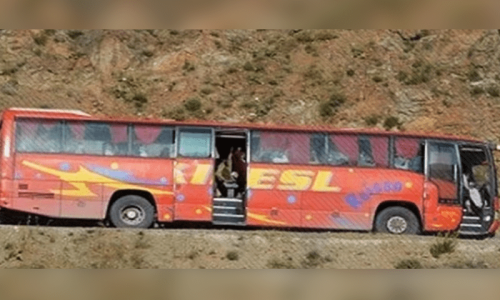
ISLAMABAD: At the conclusion of two days of foreign secretaries’ talks, India said on Friday it could discuss the Kashmir issue with Pakistan only if the ‘shadow of gun’ — a pointed reference to terrorist groups targeting India — was removed.
Besides this categorical proclamation, which blew away the façade of cordiality and progress that both sides tried to build since Thursday using all possible feel-good phrases, India and Pakistan agreed to hold three meetings of working groups ahead of their foreign ministers’ meeting in July.
Still, the foreign secretaries made it a point to end the parleys with good optics. Initially, they planned to address separate press conferences, but once the word spread that there was no progress in the dialogue, they agreed to jointly speak to the media.
Indian Foreign Secretary Nirupama Rao said: “We must do away with the shadow of gun and extremist violence because it is only in the atmosphere free of terror and violence that we can discuss resolution of such a complex issue (Kashmir).”
She was so emphatic in her pleading for reining in terror groups allegedly based in Pakistan that during her 18 minutes press interaction she thrice spoke about importance of “an atmosphere free of terror and violence” for future ties and twice mentioned ‘shadow of gun’.
Ms Rao said during the two days’ meetings she had underscored the need for a “satisfactory closure” of trial of 26/11 Mumbai attack suspects being held in Pakistan. That would “enable us (India) to move on with the process of normalisation”, she added.
The talks were on peace and security, including nuclear and conventional confidence-building measures, and Jammu and Kashmir and friendly exchanges, but India, much to the chagrin of Pakistan, succeeded in raising the issue of Mumbai case which has been progressing tardily.
Pakistan could only respond to India tabling Mumbai -- a subject of interior/home ministers’ discussion -- at the unusual forum meant for discussing other themes by complaining about slow-paced Samjhauta Express bombing investigations. Neither Balochistan nor other instances of alleged Indian involvement in subversive activities in Pakistan which, otherwise, form an essential part of the establishment’s anti-India rants, were pointed out.
More significantly, the Pakistani delegation could only get a curt response from Ms Rao on the Samjhauta bombing, who told them to “wait and be patient”.
Secretary Salman Bashir, who was barely audible at the press conference, acknowledged Indian concerns about the Mumbai incident and said: “We hope and expect that this issue in a generic sense -- the issue of terrorism --requires objectivity; requires to be addressed in a collaborative approach.”
Ms Rao pragmatically said that “complexities in the relationship” allowed incremental steps for promoting mutual confidence and understanding. Two notable outcomes of the talks were agreements on convening separate meetings of experts on nuclear and conventional CBMs to discuss implementation and strengthening of the existing arrangements and to consider additional measures; and a meeting of the working group on cross-LoC CBMs.
The nuclear and conventional CBMs included an Indian proposal for inclusion of cruise missile tests in the existing 2005 bilateral agreement on pre-notification of flight testing of ballistic missiles.
The Pakistani side put forward a proposal for exchanging experiences and expertise in nuclear technology, particularly about the operation and safety mechanisms of atomic power plants.
The two proposals would be examined at the expert-level meetings whose dates, a joint declaration said, “will be worked out through diplomatic channels”.
The working group on cross-LoC CBMs will make recommendations for fortification and streamlining of the existing trade and travel arrangements across the LoC and suggest modalities for introducing additional measures. The group will meet in July before foreign ministers’ meeting in Delhi.
Salman Bashir termed the agreement on meeting of the working group a major step forward. “I think the decision to reconvene the working group on LoC CBMs on the issue of facilitating further the travel and trade arrangements is all directed to take this process forward with a view to creating more comfort and relief for the Kashmiri people.”
Ms Rao welcomed the decision and said: “The convening of the LoC CBMs working group, I think, is a very important step because I have always maintained that people are at the heart of our relationship and we must help the people of Jammu and Kashmir to connect with each other, to trade, to travel more easily and essentially I think this is the process we need to build on, to strengthen, to sustain.”
APP adds: According to the joint statement, the foreign secretaries noted that Pakistan and India recognised that terrorism posed a continuing threat to peace and security. They reiterated their countries’ firm and undiluted commitment to fighting and eliminating terrorism in all its forms and manifestations. They agreed to strengthen cooperation on counter-terrorism.
The foreign secretaries exchanged views on the Kashmir issue and agreed to continue discussions in a purposeful and forward looking manner with a view to finding a peaceful solution by narrowing divergences and building convergences.
The two sides agreed to promote friendly exchanges between the two countries. They noted with satisfaction the progress made towards finalisation of the visa agreement which would help liberalise the visa regime and facilitate people-to-people, business-to-business and sports contacts.
The two sides also discussed measures for promoting cooperation in various fields, including facilitating visits to religious shrines, media exchanges, holding of sports tournaments and cessation of hostile propaganda against each other.










































